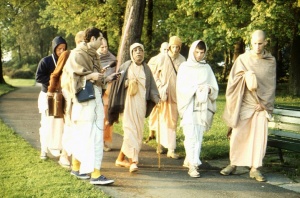CC Madhya 8.246

A.C. Bhaktivedanta Swami Prabhupada
TEXT 246
- ‘kīrti-gaṇa-madhye jīvera kon baḍa kīrti?’
- ‘kṛṣṇa-bhakta baliyā yāṅhāra haya khyāti’
SYNONYMS
kīrti-gaṇa-madhye — among glorious activities; jīvera — of the living entity; kon — which; baḍa — greatest; kīrti — glory; kṛṣṇa-bhakta — a devotee of Lord Kṛṣṇa; baliyā — as; yāṅhāra — of whom; haya — there is; khyāti — the reputation.
TRANSLATION
Śrī Caitanya Mahāprabhu then asked Rāmānanda Rāya, “Out of all glorious activities, which is the most glorious?” Rāmānanda Rāya replied, “That person who is reputed to be a devotee of Lord Kṛṣṇa enjoys the utmost fame and glory.”
PURPORT
The greatest reputation a living being can have is to be a devotee of Kṛṣṇa and to act in Kṛṣṇa consciousness. In the material world everyone is trying to be famous by accumulating a large bank balance or material opulence. There is a steady competition among karmīs attempting to advance in a wealthy society. The whole world is turning in accordance with that competitive mood. But this kind of name and fame is temporary, for it lasts only as long as the temporary material body exists. One may become famous as a brahma-jñānī, an impersonalist scholar, or one may become a materially opulent person. In either case, such reputations are inferior to the reputation of Kṛṣṇa’s devotee. In the Garuḍa Purāṇa it is said:
- kalau bhāgavataṁ nāma durlabhaṁ naiva labhyate
- brahma-rudra-padotkṛṣṭaṁ guruṇā kathitaṁ mama
“In this Age of Kali, the fame of one who is known as a great devotee is very rare. However, such a position is superior to that of the great demigods like Brahmā and Mahādeva. This is the opinion of all spiritual masters.” In the Itihāsa-samuccaya, Nārada tells Puṇḍarīka:
- janmāntara-sahasreṣu yasya syād buddhir īdṛśī
- dāso ’haṁ vāsudevasya sarvāl lokān samuddharet
“After many, many births, when a person realizes that he is the eternal servant of Vāsudeva, he can deliver all the worlds.” In the Adi Purāṇa, in a conversation between Kṛṣṇa and Arjuna, it is said, bhaktānām anugacchanti muktayaḥ śrutibhiḥ saha: “The most exalted position of liberation is given by Vedic knowledge. Everyone follows in the footsteps of the devotee.” Similarly, in the Bṛhan-nāradīya Purāṇa it is further stated, adyāpi ca muni-śreṣṭhā brahmādyā api devatāḥ: “Until now, even the great demigods like Brahmā and Lord Śiva did not know the influence of a devotee.” The Garuḍa Purāṇa similarly states:
- brāhmaṇānāṁ sahasrebhyaḥ satra-yājī viśiṣyate
- satra-yājī-sahasrebhyaḥ sarva-vedānta-pāragaḥ
- sarva-vedānta-vit-koṭyā viṣṇu-bhakto viśiṣyate
- vaiṣṇavānāṁ sahasrebhya ekānty eko viśiṣyate
“It is said that out of thousands of brāhmaṇas, one is qualified to perform sacrifices, and out of many thousands of such qualified brāhmaṇas expert in sacrificial offerings, one learned brāhmaṇa may have passed beyond all Vedic knowledge. He is considered the best among all these brāhmaṇas. And yet, out of thousands of such brāhmaṇas who have surpassed Vedic knowledge, one person may be a viṣṇu-bhakta, and he is most famous. Out of many thousands of such Vaiṣṇavas, one who is completely fixed in the service of Lord Kṛṣṇa is most famous. Indeed, a person who is completely devoted to the service of the Lord certainly returns home, back to Godhead.”
There is also the following statement in Śrīmad-Bhāgavatam (SB 3.13.4):
- śrutasya puṁsāṁ sucira-śramasya
- nanv añjasā sūribhir īḍito ’rthaḥ
- tat-tad-guṇānuśravaṇaṁ mukunda-
- pādāravindaṁ hṛdayeṣu yeṣām
“After much hard labor, a person highly learned in Vedic literature certainly becomes very famous. However, one who is always hearing and chanting the glories of the lotus feet of Mukunda within his heart is certainly superior.” In the Nārāyaṇa-vyūha-stava it is said:
- nāhaṁ brahmāpi bhūyāsaṁ tvad-bhakti-rahito hare
- tvayi bhaktas tu kīṭo ’pi bhūyāsaṁ janma-janmasu
“I do not aspire to take birth as a Brahmā if that Brahmā is not a devotee of the Lord. I shall be satisfied simply to take birth as an insect if I am given a chance to remain in the house of a devotee.”
There are many similar verses in Śrīmad-Bhāgavatam, especially 3.25.38, 4.24.29, 4.31.22, 7.9.24, and 10.14.30.
It was Lord Śiva who said, “I do not know the truth about Kṛṣṇa, but a devotee of Lord Kṛṣṇa knows all the truth. Out of all the devotees of Lord Kṛṣṇa, Prahlāda is the greatest.”
Above Prahlāda, the Pāṇḍavas are supposedly more advanced. Above the Pāṇḍavas are the members of the Yadu dynasty, who are even more advanced. In the Yadu dynasty, Uddhava is the furthest advanced, and above Uddhava are the damsels of Vraja-dhāma, the gopīs themselves.
In the Bṛhad-vāmana Purāṇa, Lord Brahmā tells Bhṛgu:
- ṣaṣṭi-varṣa-sahasrāṇi mayā taptaṁ tapaḥ purā
- nanda-gopa-vraja-strīṇāṁ pāda-reṇūpalabdhaye
“I underwent meditation and austerities for sixty thousand years just to understand the dust of the lotus feet of the gopīs. Still, I could not understand it. To say nothing of me, even Lord Śiva, Lord Śeṣa and the goddess of fortune, Lakṣmī, could not understand it.” In the Adi Purāṇa the Supreme Personality of Godhead Himself says:
- na tathā me priyatamo brahmā rudraś ca pārthiva
- na ca lakṣmīr na cātmā ca yathā gopī-jano mama
“Lord Brahmā, Lord Śiva, the goddess of fortune and even My own self are not as dear to Me as the gopīs.” Of all the gopīs, Śrīmatī Rādhārāṇī is the topmost. Rūpa Gosvāmī and Sanātana Gosvāmī are the most exalted servitors of Śrīmatī Rādhārāṇī and Lord Śrī Caitanya Mahāprabhu. Those who adhere to their service are known as rūpānuga devotees. The Caitanya-candrāmṛta (26) gives the following statement about Śrīla Rūpa Gosvāmī:
- āstāṁ vairāgya-koṭir bhavatu śama-dama-kṣānti-maitry-ādi-koṭis
- tattvānudhyāna-koṭir bhavatu bhavatu vā vaiṣṇavī bhakti-koṭiḥ
- koṭy-aṁśo ’py asya na syāt tad api guṇa-gaṇo yaḥ svataḥ-siddha āste
- śrīmac-caitanyacandra-priya-caraṇa-nakha-jyotir āmoda-bhājām
The qualities of one engaged in the service of Lord Śrī Caitanya Mahāprabhu—such as reputation, austerities, penances and knowledge—are not to be compared to the good qualities of others. Such is the perfection of a devotee always engaged in the service of Śrī Caitanya Mahāprabhu.